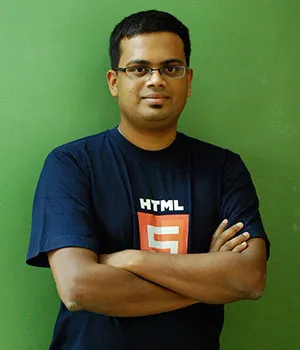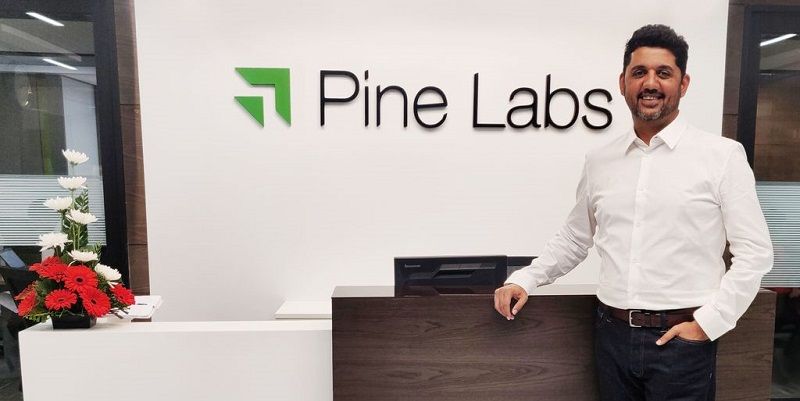[Techie Tuesdays] A 'CHIP' off the old block, Kiran Jonnalagadda - Founder, HasGeek
Fast talker, intensely focused and highly driven; this is how you describe Kiran Jonnalagadda -- one of the foremost hackers and ecosystem enablers in the country. Always coming up with ideas and strong opinions on how software should be handled and worked on, Kiran has an insatiable thirst for learning.
Kiran is the founder of HasGeek, a place for like-minded hackers to discuss and hangout. HasGeek also conducts tech events and hackathons apart from operating a very popular Job Board. Kiran has been at the centre of the tech ecosystem in the country since its onset in the late 90s. He got his first job with ‘CHIP’ magazine, which was just launched in India. He worked as a tech writer at ‘CHIP’ for some time, and did not even complete his schooling by then. On asking how he got accepted into ‘CHIP’, Kiran says he went with full confidence for the interview, he knew what he was talking about.
Thousands of miles away, somewhere in the Silicon Valley two PhD students were building what would later be known as Google, arguably the coolest company on earth to work for. While in India, this 18-year-old kid was working on a project to build the first GPS integrated map of Bangalore. Remember we are talking about 1998 when GPS devices were extremely costly and Google Maps were unheard of at that time. It was mainly this project along with his other hacks which helped him get into ‘CHIP’.
The work culture at ‘CHIP’ was really amazing; the people there left a very big influence in his life. Gourav Jaswal, who was editor at CHIP, influenced Kiran the most. A very critical person who helped him move in the right direction and was also responsible for introducing Kiran 'the coder' to a world of PR, Sales and Marketing. Though Kiran spent seven months as a writer at ‘CHIP’, he says he couldn't fit in; "It never did justice to what I was doing." Later, ZDNet partnered with ‘CHIP’ and Kiran coded the first version of the ‘CHIP’ website.

After his stint there, Kiran joined Gourav at his new company Synapse, based out of Goa, where he worked for over six months. Later, Kiran decided to go back and complete his education, and came back to Bangalore to write his exams.
But alas! People weren't happy to see him at his college (Mahaveer Jain College); he had broken their record of 100% pass percentage. He had started sporting long hair, sort of a rebellious teenager. Kiran cleared his PU after five attempts. During this time his only saving grace was his dad who had at least some idea of what he was doing.
An early exposure to computers played a huge role in Kiran's upbringing. He got his first computer in 1986, A ZX-Spectrum which was a British made 8-bit computer with 3.5MHz Processor. It was essentially used to play games. As his family moved to Bangalore in 1989, Kiran got a membership at the local library and started borrowing children books there. "We used to get three books from the library and I used to finish two books in a day, exchanging them the next day for more."
In the early 90's, they upgraded to 80286 based processor computer, which also led him to begin programming. Kiran would borrow computer books from his library and code away to glory only to find out that it never worked. He would spend days figuring out what was wrong with the code trying to debug line by line. And finally realize that the code he typed was meant for a different kind (architecture) of computer.
Around the same time there used to be a lot coding contests and workshops at Vishveshwarya Museum to encourage programming among students. It was an opportunity for learning as one could see what others were working on and learn from them. “While coding for one of the programs, we had to face a lot of struggle to draw the graphics, it was distracting us from writing our main code.” So he sat down one day and wrote a program to draw graphics on screen which could be used again and again. As there was very less screen space (40 columns x25 rows) to code, Kiran wrote his own font for better readability. Code sharing was a difficult task back then as one had to physically transfer it via floppy disks which were quite costly.
"Most of my school time was spent in playing around with graphics and fonts, trying out different ways to draw different things. Finally, I created a program to draw my own 2D vector based graphics. Essentially, I was coming up with original ways to build things because I had no access to reading material. So this is what I was doing when most kids were busy having a social life," says Kiran.
Most of his learning was by trial and error as computer books were very costly and access to them was limited. Internet was at its nascent stage, Netscape was unheard of and all they had were bulletin boards to communicate with like-minded people. You could not spend more time online as there were other people who were waiting for their turn to come on the board.
"In the process of trying to read up about computers, I discovered ‘PCQuest’ Magazine. My dad had been a columnist at some point of time, so he used to get them home. It was while reading the magazine I saw the picture of a modem. There was a modem lying around in the house but I didn't realize it until I saw the picture in the magazine. I tried connecting it with the phone line and made my first call. It was a bulletin board named InfoMart. "
There was another bulletin board CyberInfo eXchange (CiX) which was around since 1989 and was also India's first bulletin board service. CiX was run by Atul Chitnis. Atul was a consulting editor for PCQuest and had a popular column COMversations. He was instrumental in bringing Open Source to India with his annual conference FOSS.IN. He also played a big role in ‘PCQuest’ by distributing copies of Linux with the magazine in March 1996. This exposed a lot of people to Linux but they still did not know how to use it. Few years after this, Kiran wrote a cover story for ‘CHIP’ on getting started with Linux. This was the first ever detailed guide and led to a bigger adoption of the OS.
After volunteering for FOSS.IN for some time, Kiran along with his friends started BarCamp Bangalore. BarCamp is a democratic event and by design it was meant that the team members provide place for new members to join in. In 2007, HeadStart and HasGeek were born out of BarCamp.
"I started noticing some difference between BarCamp and my workplace. BarCamp is always full of really smart people. You have great conversations over there; and you get new ideas every single time. At work, that wasn't the case. I was dealing with boring enterprise software, where you are dealing with the politics of the whole process more than you are dealing with technology. One of the questions was what is going on here. Why is it that a place called BarCamp gets so many interesting people and you can't hire them at work? All the people you meet at BarCamp say that I wish I could work with these people. How do you make that happen? You only work with a bunch of idiots at your company and you meet smart people here and you somehow cannot be a company with these smart people," says Kiran, about the dilemma which led to the birth of HasGeek.
Most people his age are senior manager or vice presidents at big corporate houses or have left coding. But a look at his Github profile will tell you a different story. Kiran says he has been through enough management to know that this is not something to aspire to. Coders will agree!!
Before I could realize, I had spent three hours with Kiran for what was supposed to be a 40-minute interview. While parting, he shared few valuable pieces of advice for people who are just starting out in the industry.
1) As a coder, do not despise marketing.
2) Do not define yourself in terms of job opportunities.
3) While coming from college you are admired by your peer group, but once you step into the real world, keep your ego aside, you will meet a lot of people who are smarter than you.
Say hi to Kiran.






![[Techie Tuesdays] A 'CHIP' off the old block, Kiran Jonnalagadda - Founder, HasGeek](https://images.yourstory.com/cs/wordpress/2014/05/KIRAn.jpg?mode=crop&crop=faces&ar=2:1?width=3840&q=75)
![[App Fridays] Inside Clubhouse, the invite-only voice social network taking Silicon Valley by storm](https://images.yourstory.com/cs/2/dc9aa1302d6c11e9aa979329348d4c3e/Untitleddesign-2021-01-14T172905-1610625575661.png)

